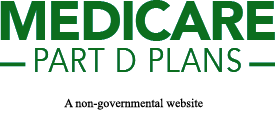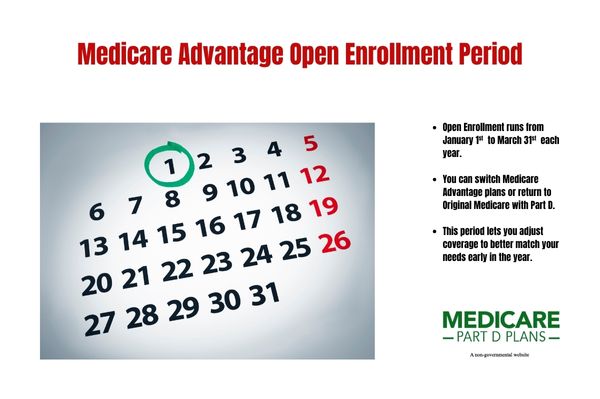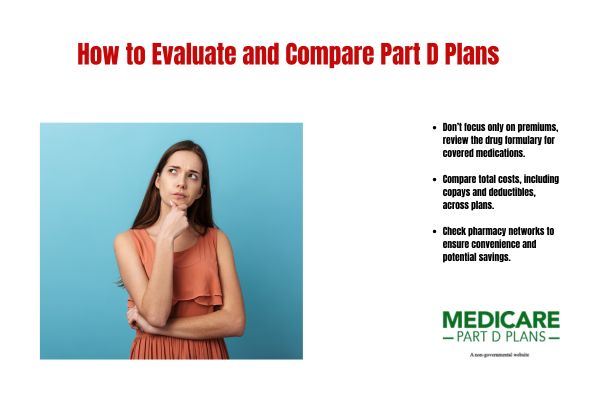Find a Medicare Part D prescription drug plan

Medicare Part D
Prescription Drug Coverage 2026
Changing Medicare Part D Plans
Looking to change your Medicare Part D plans? Learn when you can switch, the steps to do it, and why it might be necessary when considering changing Medicare Part D plans.
Key Takeaways
- Understanding designated enrollment periods—Annual Open Enrollment, Medicare Advantage Open Enrollment, and Special Enrollment Periods—is crucial for switching Medicare Part D plans.
- Evaluating your current plan based on your health needs, potential costs, and the plan’s service area may be essential before making a switch.
- When switching plans, review the formulary, compare total costs, and ensure your preferred pharmacies might be in-network to help avoid unexpected expenses.
When Can You Change Your Medicare Part D Plan?
Timing is crucial when changing your Medicare Part D plan. Specific enrollment periods are designated for making changes based on your circumstances.
The Annual Open Enrollment Period, the Medicare Advantage Open Enrollment Period, and Special Enrollment Periods (SEPs) are your windows of opportunity. Missing these windows could result in delayed coverage or penalties, so awareness is key.
Understanding each period in detail could help ensure you don’t miss out on the chance to switch plans when needed.
Annual Open Enrollment Period
The Annual Open Enrollment Period is the prime time to reassess your Medicare prescription drug coverage. Running from October 15 to December 7 each year, this period allows you to switch plans, with any changes taking effect on January 1 of the following year.
If your health has changed or you want to explore better options, this is the ideal time to switch plans.
Medicare Advantage Open Enrollment Period
From January 1 to March 31, the Medicare Advantage Open Enrollment Period offers another opportunity to switch plans. During this time, you can change your Medicare Advantage plan or revert to Original Medicare, including Part D options.
This period allows you to adjust your coverage to better suit your needs early in the calendar year.
Special Enrollment Periods (SEPs)
Life is unpredictable, and sometimes specific circumstances require a change in your Medicare plan outside the standard enrollment periods. Special Enrollment Periods (SEPs) accommodate these other situations.
Qualifying events such as moving out of your plan’s service area or losing other creditable drug coverage can trigger an SEP, allowing you to enroll in a new plan tailored to your new circumstances if you qualify and are eligible.
Reasons to Consider Changing Your Medicare Part D Plan
Switching your Medicare Part D plan isn’t just about finding a plan with a lower premium. It’s about ensuring that your prescription drug coverage meets your current needs and fits your budget.
Possible changes in health, rising costs, or a less convenient service area may also be compelling reasons to reassess your coverage.
Possible Changes in Prescription Drug Needs
Health conditions evolve, and so do your medication needs. If you’ve been diagnosed with a new condition or your current prescriptions have changed, make sure your Medicare Part D plan covers these medications.
Reviewing your health insurance plan’s formulary during open enrollment may help prevent surprises and possibly ensure you have the necessary insurance coverage.
Plan Cost Adjustments
Various premiums, deductibles, and copayments might strain your budget, so exploring other Medicare Part D plan options might be necessary. Comparing costs across different plans could help you find one with better cost-sharing structures and lower out-of-pocket expenses, especially when considering drug costs.
Consider the total annual costs, not just the monthly premium, to find a plan that fits your financial situation and pay your expenses effectively.
Plan’s Service Area Changes
A Medicare Part D plan’s service area will likely define where its coverage is available. If your plan changes its service area or network, it might no longer cover your prescriptions.
Staying informed about these changes could help you switch to a new plan that meets your needs and offers coverage in your location.
How to Evaluate and Compare Part D Plans
Choosing the right Medicare Part D plan will likely involve more than just looking at premiums. Reviewing the formulary, comparing costs, and checking the pharmacy networks could help ensure you select a Medicare drug plan with the best benefits for your unique situation.
Reviewing the Formulary
A formulary is a list of prescription drugs covered by a Part D plan. Regularly reviewing your plan’s formulary may help ensure your medications and drugs may be covered and might help avoid unexpected costs.
Possible changes in your health or new prescriptions might require you to switch plans if your current one no longer covers your necessary medications.
Comparing Costs
When evaluating Medicare Part D plans, consider the total costs, such as premiums, deductibles, and out-of-pocket expenses. Focusing solely on the monthly premium may be misleading, as other costs could significantly impact your overall healthcare budget.
A comprehensive cost comparison could help you choose a plan that offers the best value.
Checking Pharmacy Networks
Ensuring your preferred pharmacies and their providers may be included in a plan’s network could potentially affect your medication costs. Using in-network pharmacies might lead to lower costs due to negotiated discounts.
Verify that your preferred pharmacies may be included in your plan’s network to potentially avoid higher out-of-network costs.
Steps to Switch Your Medicare Part D Plan
Switching your Medicare Part D plan will likely involve reviewing your current plan, selecting a new one, and enrolling during the appropriate period. Following these steps ensures a smooth transition to better coverage.
Contacting a Licensed Agent
Contacting one of our licensed agents using the number on this website can provide personalized assistance and help you understand your options. Have your Medicare number and details about your current plan ready to make the contact conversation more efficient.
Enrolling in a New Plan
Before enrolling in a new Medicare Part D plan, confirm that it covers your required prescriptions and is available in your service area. This will likely ensure you receive the coverage you need without any gaps or unexpected costs.
If your current plan ceases operating in your area, selecting a new plan may become necessary.
Automatic Disenrollment from the Previous Plan
When you enroll in a new Medicare Part D plan, your previous plan will automatically disenrolled you once the new coverage takes effect. This automatic process might help to prevent any gaps in your prescription drug coverage and possibly eliminates the need for manual cancellation.
What Happens After You Switch Plans
After switching your Medicare Part D plan, consider the following:
- There might be a brief period before your new benefits become active.
- During this transition, ensure your medications are covered.
- Monitor your new plan for any issues.
See plans in your area instantly!
Advertisement
Coverage Begins
Your new Medicare Part D coverage typically starts on the first day of the month following your enrollment. You will likely receive a notification from your new plan indicating the exact start date of your coverage.
Transitioning Prescriptions
During the transition to your new plan, consult your new insurer to ensure your medications are covered. Verify that all your prescriptions may be included in the new plan’s formulary to avoid any disruption in your medication regimen.
Monitoring Your New Plan
Regularly review your new Medicare Part D plan’s benefits to identify any issues early on. This proactive approach might help you catch discrepancies or changes in coverage, possibly ensuring you receive the benefits you signed up for.
Common Mistakes to Avoid When Switching Plans
Switching Medicare Part D plans may be complex, and mistakes could lead to unexpected costs and coverage gaps. Common errors might include ignoring formulary changes, not considering total costs, and missing enrollment deadlines.
Avoid these pitfalls to ensure a smooth transition to your new plan.
Ignoring Formulary Changes
Reviewing the updated full list of covered medications will likely be essential when switching plans. Failing to check for formulary updates could result in unexpected out-of-pocket expenses for necessary covered drugs prescriptions.
Not Considering Total Costs
Some individuals might make the mistake of focusing solely on premiums when choosing a Medicare Part D plan, neglecting other important cost factors like deductibles, copayments, and out-of-pocket maximums. Accounting for all potential costs will likely be crucial to avoid unexpected expenses.
Missing Enrollment Deadlines
Recognizing enrollment deadlines is essential for maintaining continuous coverage and avoiding gaps. Missing these deadlines may prevent you from making necessary changes to your coverage and might lead to gaps in essential health care services.
Be aware of all relevant enrollment periods to avoid these pitfalls.
Find a Plan and Enroll Online Yourself!
Advertisement
Summary
Switching your Medicare Part D plan could lead to better coverage and potential savings, but it will likely require careful consideration and planning. Understanding the different enrollment periods, evaluating your current needs, comparing potential costs, and verifying formularies and pharmacy networks may all be critical steps in this process.
By avoiding common mistakes and being proactive, you will likely find a plan that best suits your health and financial needs. Stay informed, stay prepared, and take charge of your Medicare prescription drug coverage. It’s a journey worth taking for your peace of mind and well-being.
Frequently Asked Questions
When can I change my Medicare Part D plan?
You may change your Medicare Part D plan during the Annual Open Enrollment Period from October 15 to December 7, the Medicare Advantage Open Enrollment Period from January 1 to March 31, or during Special Enrollment Periods due to specific life events. Make sure to take advantage of these times to ensure you have the best coverage for your needs.
What should I consider when switching Medicare Part D plans?
When switching Medicare Part D plans, evaluate your current prescription needs, the overall costs of the new plan, and ensure that your medications may be covered. Additionally, review the pharmacy network and any potential changes in the plan’s service area before making a decision.
How do I enroll in a new Medicare Part D plan?
To enroll in a new Medicare Part D plan, you can do so through this website or by calling one of our licensed agents at 1-866-930-4039 (TTY 711) Mon-Fri: 8am-8pm EST. Make sure to complete your enrollment within the specified timeframe to ensure coverage.
What happens to my old Medicare Part D plan when I switch to a new one?
When you switch to a new Medicare Part D plan, your old plan will automatically disenroll you once the new coverage takes effect, possibly ensuring no gaps in your prescription drug coverage.
What should I do if my new Medicare Part D plan does not cover my medications?
If your new Medicare Part D plan does not cover your medications, consult your insurer to confirm coverage and review the plan’s formulary. If needed, consider switching to a plan that better meets your prescription needs.
Begin Choosing your plan
Advertisement
ZRN Health & Financial Services, LLC, a Texas limited liability company.




